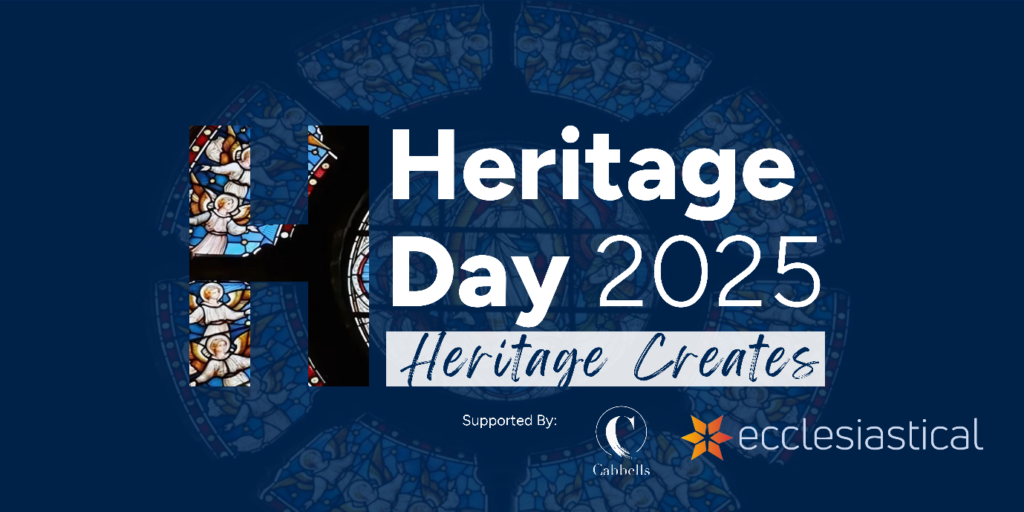
Heritage Day 2025 was held on 5th March at the iconic Tower of London. Heritage leaders, professionals and volunteers gathered to engage with panels, , case studies, keynote speeches and the Ecclesiastical’s Heritage Heroes awards ceremony, all focused on the theme of ‘Heritage Creates’.
Carole Souter CBE, Chair of the Heritage Alliance, opened the day.
She welcomed attendees to the event and thanked corporate partners Ecclesiastical Insurance and headline sponsor Cabbells for making the event possible, along with programme sponsors The Architectural Heritage Fund, the National Lottery Heritage Fund, City & Guilds, and Farcroft Restorations Group, as well as venue sponsor Historic Royal Palaces and accessibility sponsor StageText.
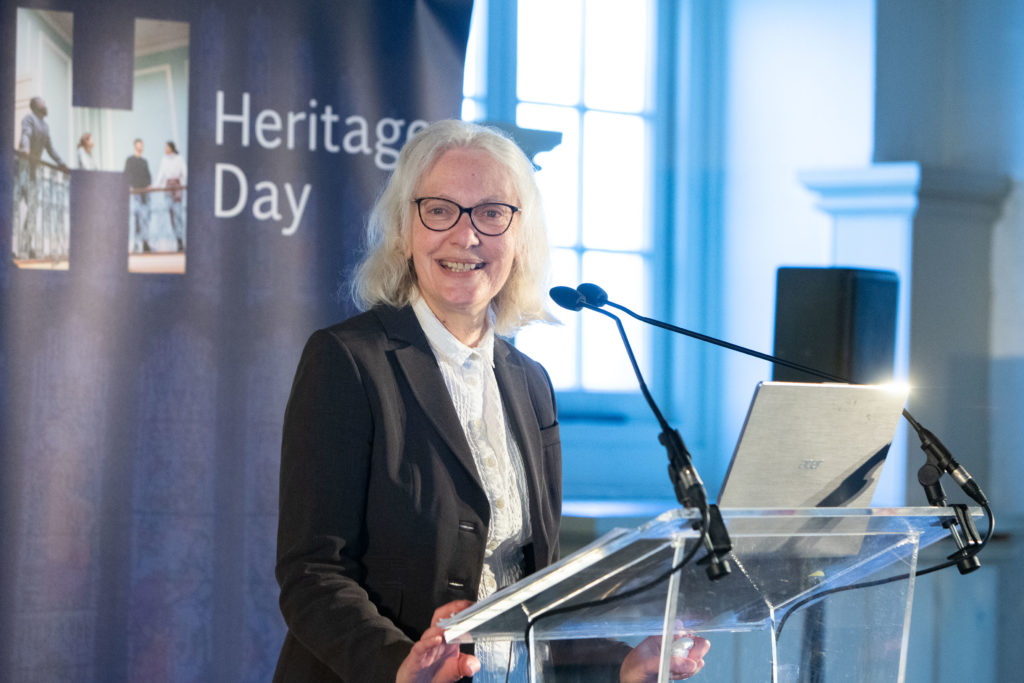
Part 1: Opening Sessions
Andrew Jackson CBE, Tower Director at Historic Royal Palaces, welcomed delegates to the venue, sharing insights into the organisation’s strategy for the creative use of their six palaces.
“Acting for the future is about conserving these places for the next 1,000 years, but more than that, it is about embracing sustainability so that we move forward in a responsible fashion, and it is critically, about the young people and the communities that surround us.”
He outlined HRP’s ambitious programme to transform the Tower’s visitor journey and facilities over the next decade, with a focus on education and community spaces, accessibility, and sustainability. The £70 million project will include new interpretation to tell stories in different ways, improved entrance facilities, and the creation of biodiversity and an enhanced landscape in the moat.
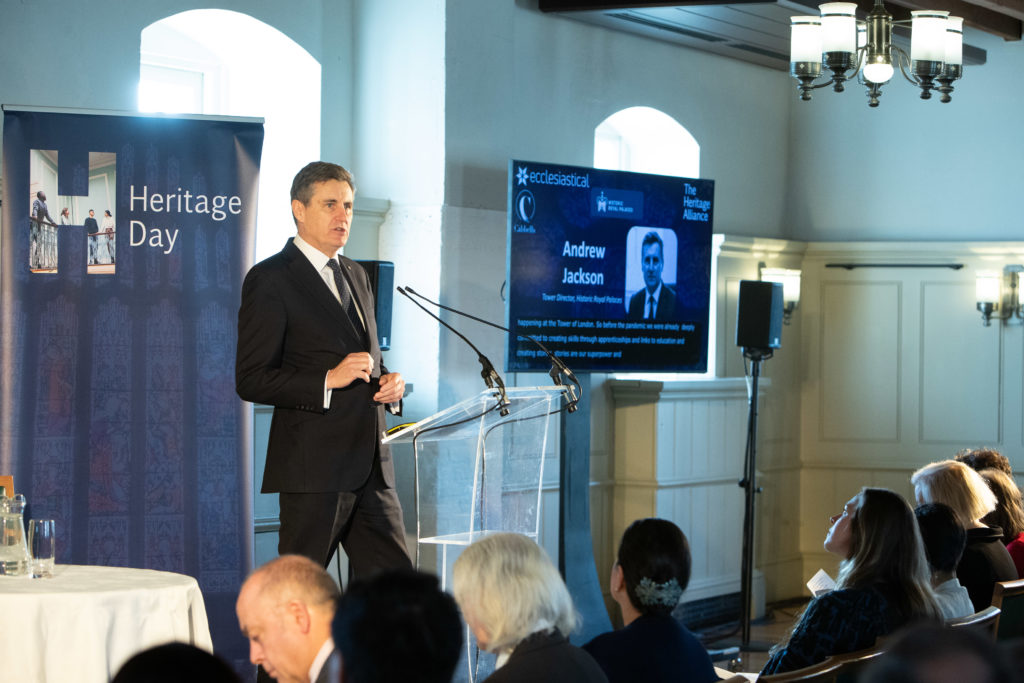
The Ministerial Address was delivered by Baroness Twycross, Parliamentary Under-Secretary at the Department for Culture, Media and Sport. Speaking to the assembled sector representatives, she began by sharing her own perspective.
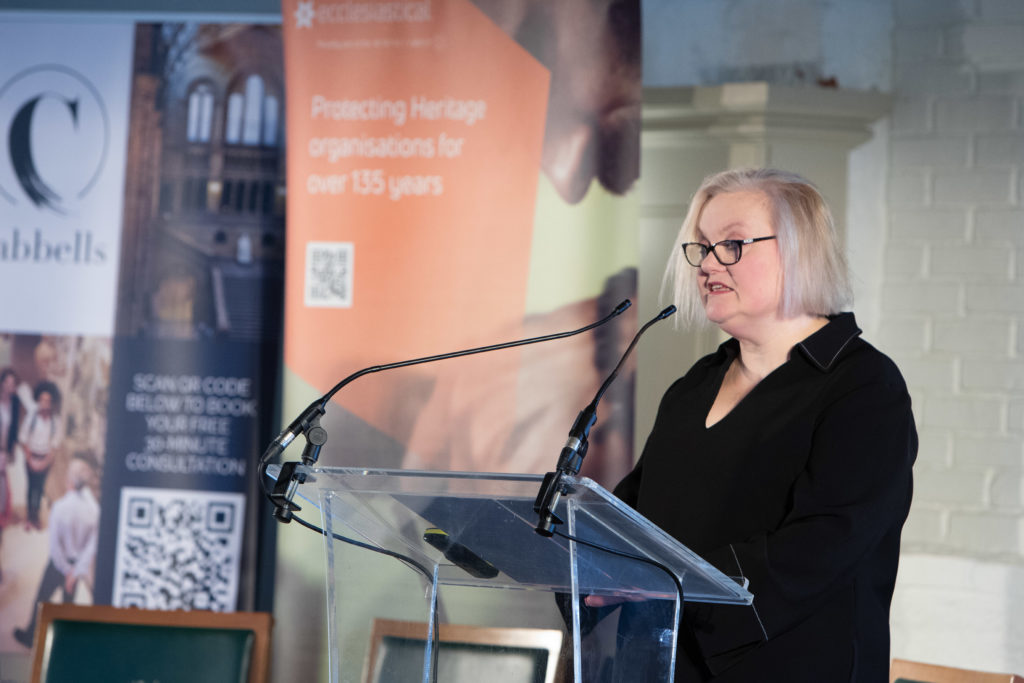
Part 2: Heritage Creates Skills and Solutions
The day continued with two panel discussions exploring how heritage creates both skills and policy solutions.
Heritage Creates Skills, sponsored by Farcroft Restorations Group and City & Guilds Foundation, examined the crucial role of traditional craftsmanship in both preserving our heritage and fuelling creative industries. Chaired by Delphine Jasmin-Belisle, Head of Development and Membership at the Heritage Alliance, the panel brought together Patrick Craven (City & Guilds), Daahir Mohamed (Amar Eco-Plaster), Danny Bennett and Cedric Tigier (Farcroft Restorations Group).
Daahir Mohamed shared his experience of engaging refugees in heritage skills: “There’s about 100,000 refugees every year coming to the country and about 30,000 to 40,000 people are being granted asylum, which allows them to work … Now, I know a lot of those people come with skills, transferable skills. They are really eager to get into the sector.”
The panel emphasised the need for more awareness, training opportunities, and commercial understanding to build a future pipeline of craftspeople, with Patrick Craven highlighting the potential for heritage skills hubs throughout the country: “Creating enough supply nationally around the country for it to be sustainable will also allow you to aggregate the experts that are needed.”
Danny Bennett also articulated the need to be actively engaging youth to grow a future pipeline: “the important thing is pulling youth from some of the modern industries […] representation and awareness are really, really important.“
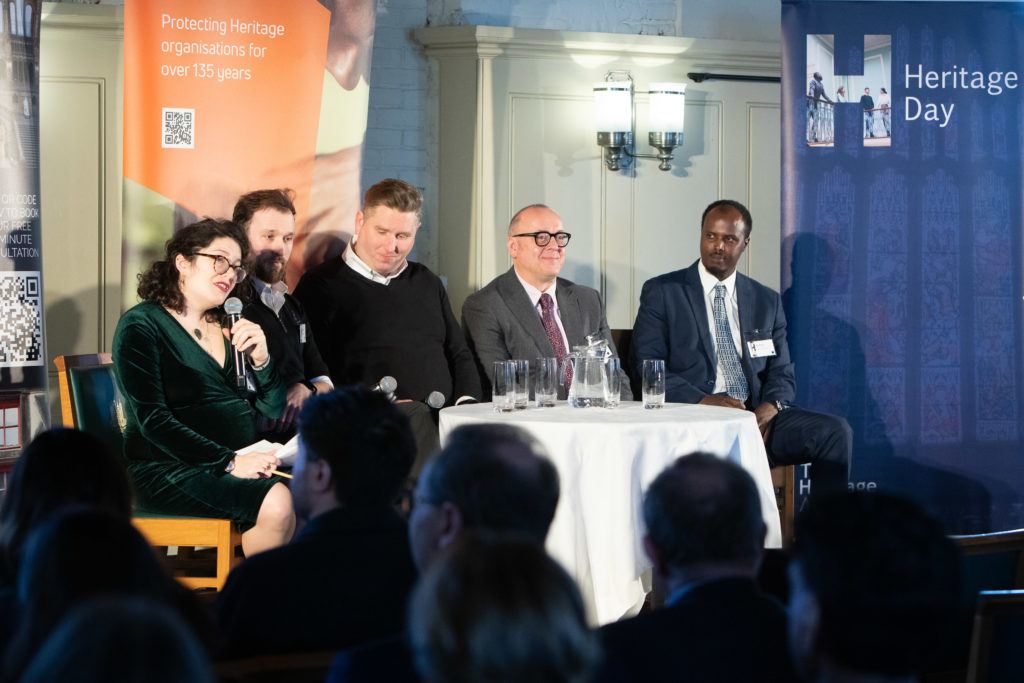
Heritage Creates Solutions brought together parliamentary, sector and arms-length-body representatives to explore how heritage contributes to effective policymaking and drives forward solutions that benefit communities, the economy, and the environment.
Chaired by Lizzie Glithero-West, CEO of the Heritage Alliance, this panel included Baroness Jane Bonham-Carter (Liberal Democrat Peer and Lords DCMS Spokesperson), Lord Stephen Parkinson (Conservative Peer and Shadow Minister for Arts and Heritage), Duncan Wilson CBE (Chief Executive of Historic England) and Dr Ingrid Samuel OBE (National Trust Placemaking Director and Deputy Chair of the Heritage Alliance).
Lord Parkinson reflected on the importance of heritage during challenging times: “When I joined DCMS, we were emerging from the pandemic and a period of time when everybody had been cut off from so much of the world around them … I think it really underlined just how much heritage matters to people. I saw the sector, which faced extraordinary challenges during that time, when we had to shut doors but do things differently. People were being very inventive about sharing things online.“
The discussion focused on how heritage can contribute constructively to policymaking, ensure better sector support and integration into long-term political decision-making, and proactively enhance its own resilience. Lord Parkinson noted that great ideas come from the sector and lobbying, such as around ratification the 2003 Convention on Intangible Cultural Heritage, can lead to change. Dr Samuel highlighted work on climate adaptation and the role of heritage in nature conservation, while Duncan Wilson emphasised the need for strong independent advocates from outside the sector. He also highlighted the importance of heritage being understood as a driver for regeneration: “regeneration of the high street and heritage [have] entered the political vocabulary now in a way that it wasn’t there before”.
Baroness Jane Bonham Carter emphasised the vital role heritage organisations play in inspiring young people. She noted: “Heritage organisations have a unique ability to engage the next generation, not just through historical reconstruction but also by fostering a connection with nature and sustainability. This dual focus on history and the environment is crucial for education and skills development.”
She also noted the importance of engaging decision-makers at local as well as at a national level in this dialogue.
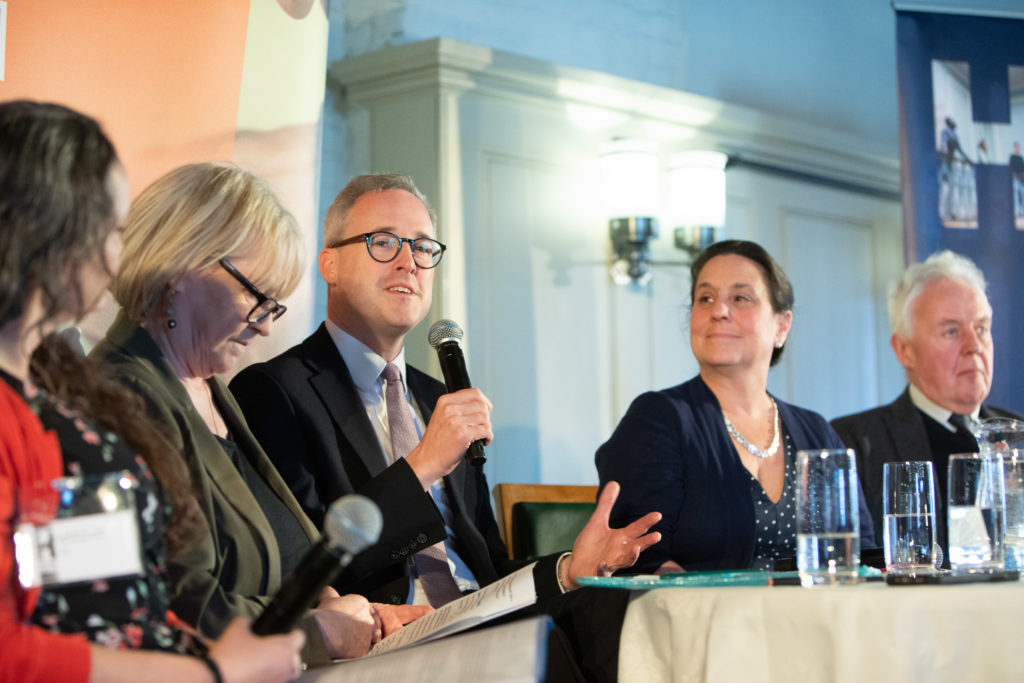
Part 3: Heritage Creates Enterprise and Homes
After lunch, delegates explored how heritage creates economic opportunities and addresses housing challenges through two focused sessions.
Heritage Creates Enterprise, sponsored by the National Lottery Heritage Fund, featured a conversation with Maria Reeves, Director of The Horton in Epsom, and Ross Williams of Redruth Revival CIC, led by George Stanley-Jones, Head of Partnerships and Innovation at the Heritage Fund. The discussion demonstrated through vivid case studies how empowering communities can be transformational for heritage as well as local people themselves.
Maria Reeves shared how The Horton, a former asylum chapel that was semi-derelict for 40 years, was transformed through community effort and Heritage Enterprise funding: “We started lobbying the council and put in a community bid to use this as an arts centre … We, at that stage, had a National Lottery Heritage Fund startup grant which was really important because we were a group of people with no money, with no track record.“
Ross Williams explained how Redruth Revival CIC purchased and renovated The Buttermarket, the last remnant of Redruth’s historic market: “We opened in November. We have been packed out pretty much every night since. The opening week or two in November and December had really nice weather. It was freezing cold, but we had 200-300 people sitting out in the courtyard in the open air, as well as people packed inside.”
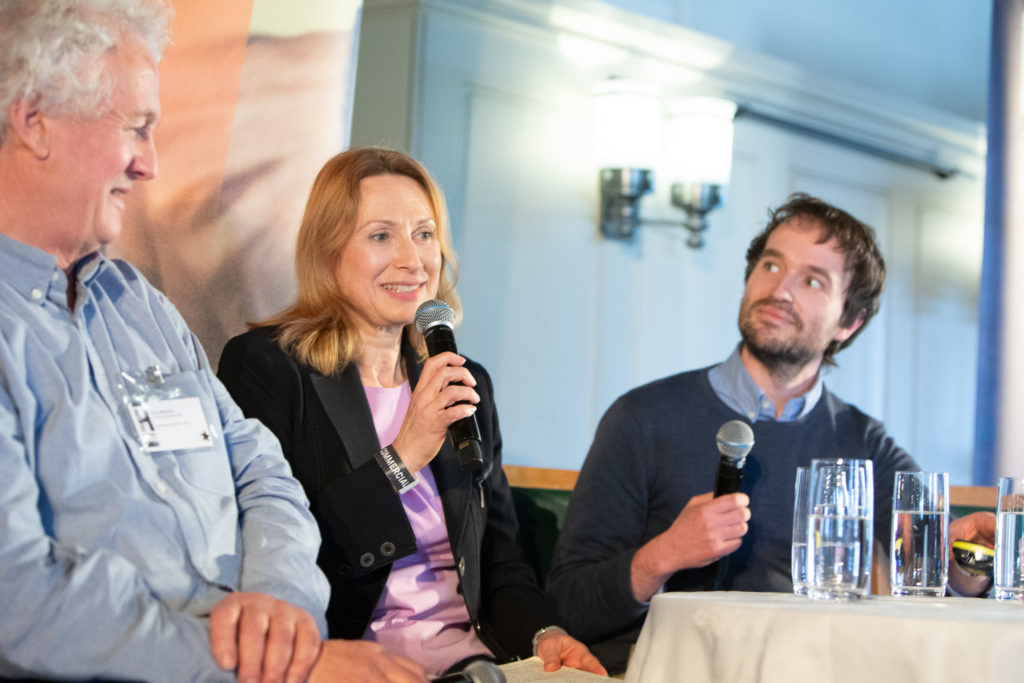
Heritage Creates Homes, sponsored by the Architectural Heritage Fund, examined how heritage reuse can help address the UK housing crisis. Chaired by Ros Kerslake CBE, the panel included Sarah Allan (Head of Architecture and Urban Design at the Ministry of Housing, Communities and Local Government), Martin Hulse (Director of Tyne + Wear Building Preservation Trust), and Martin Prince-Parrott (Chartered Architect and Real Estate Developer).
Ros Kerslake highlighted research from Historic England: “In September 2024, a piece of research that they had commissioned from Deloitte […] said that they thought that it was possible to create, from broadly redundant space in heritage buildings, 670,000 new homes.”
Martin Prince-Parrott highlighted potential solutions to ease the challenges developers face with heritage buildings: “If time is money, then speed is where the value is. There is too much friction. My personal suggestion is to introduce a Grade III listing, which would allow developers to work with heritage buildings more flexibly. By incentivising the retention of key features, we can make the process smoother and more collaborative. If we all work together, pulling in the same direction, we can save more of our buildings and bring them back into use more efficiently.”
Martin Hulse shared his experience with converting the Grade II* Keelmen’s Hospital in Newcastle: “My passion is heritage at risk. I love to drag buildings that have been empty for a decade or more back into use… We are looking to bring the building back to modern standards to create modern living in a traditional house.”
Sarah Allan highlighted the current work done by the Ministry of Housing, Communities, and Local Government: “Over the last 6 months we have carried out a qualitative survey with over 900 respondents from across the built environment sector, looking at whether the National Planning Policy Framework should say more about retrofitting and reuse of existing buildings in the future.”
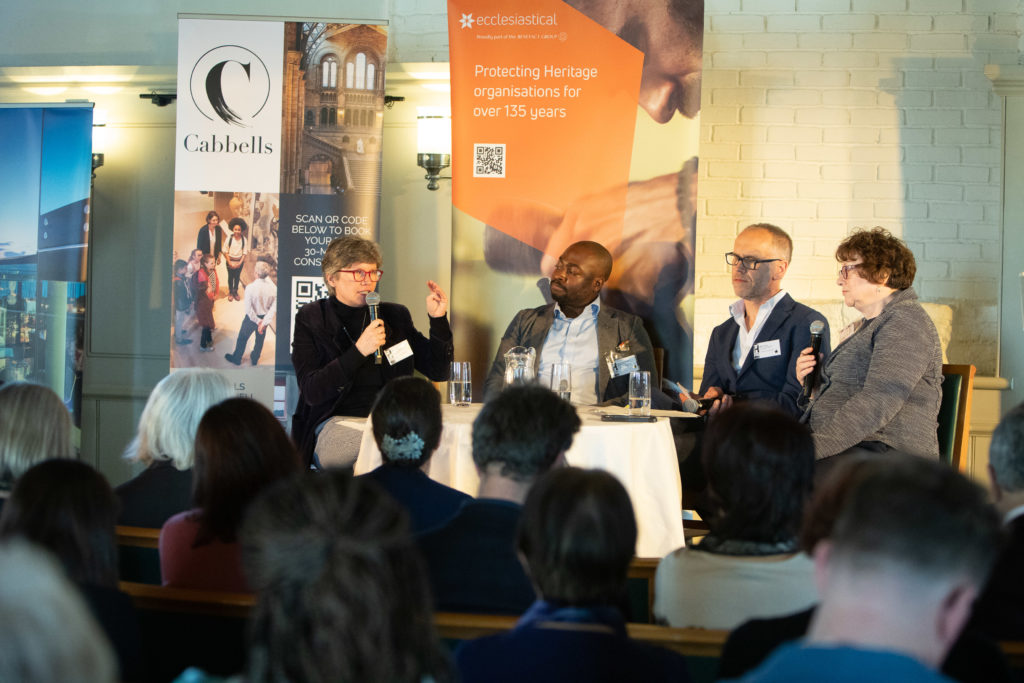
Part 4: Heritage Creates Stories and Communities
The afternoon continued with two sessions focused on the power of heritage to connect people through narrative and shared experience.
In Heritage Creates Stories, Sarah Simpson, Managing Director at Cabbells, gave tips for amplifying heritage voices. Drawing on her marketing experience, she advised: “In your stories always be authentic, don’t become over obsessed with data. Data is important to shape and target things but always keep your creative head in there…”
She encouraged organisations to distribute their content consistently and plan their marketing campaigns strategically, suggesting that heritage organisations could benefit from collaborating on joint marketing initiatives to create a united voice.
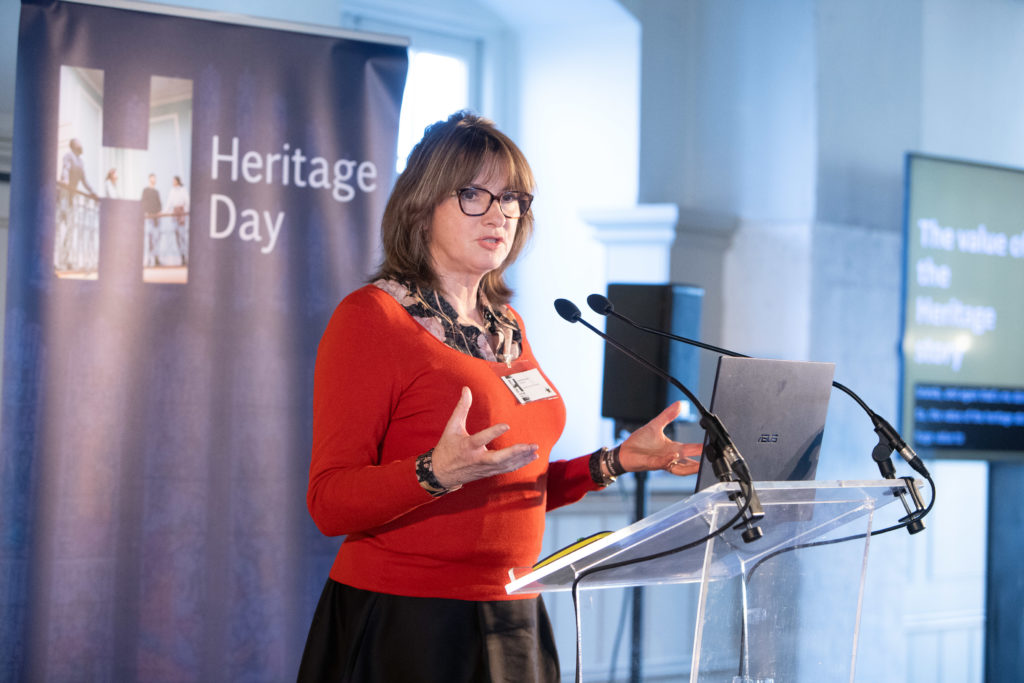
Heritage Creates Communities, featured Sarah Holloway, Programme Manager for Heritage Open Days, and Laura Carter, Customer Segment Director at Ecclesiastical Insurance. Together they explored how heritage organisations can engage meaningfully with local communities to create real impact for people.
Sarah Holloway shared a moving story about how Heritage Open Days helped to create connections in Leatherhead, Surrey through events at Rowhurst House: “[Rowhurst House’s owner] needed help and got the community on board […] two Ukrainian refugees looking for work came to help her to clear the garden. Whilst they were clearing the barriers or the brambles and language … they connected over this beautiful house and its beautiful garden.”
Their exceptional talents as classically trained singers soon emerged, leading to a moving performance during the event. This moment of creativity and community inspired further opportunities, with the singers later performing at renowned venues, yet continuing to give back to this local community through Heritage Open Days.
Laura shared the success of Project Rejuvenate in Kent, a project supported by The Benefact Trust and Historic England: “Working with the Youth Justice Team in Kent to support young, vulnerable adults who may have taken the wrong path in life and helped them to be involved in heritage and in archaeology. The thing that stuck out for me was the fact that the community was brought together by different organisations wanting to work together, to support the youth within the region.”
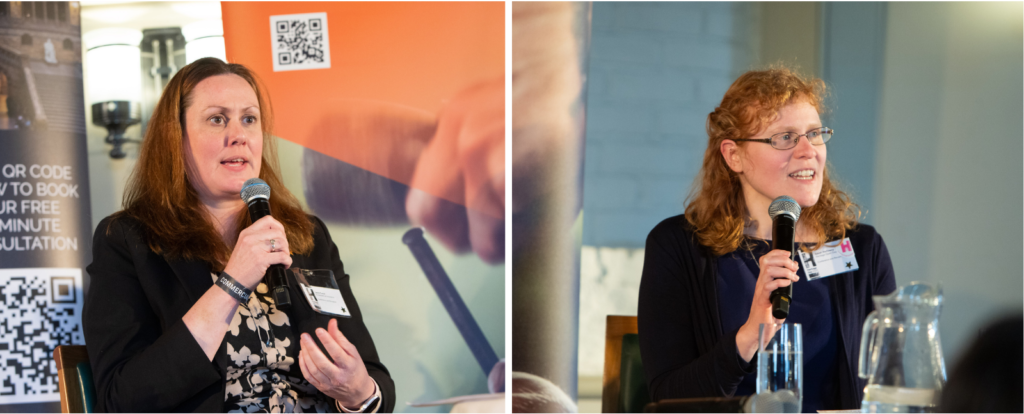
Part 5: Closing Sessions
Carole Souter CBE delivered the Heritage Alliance’s Address on ‘Heritage Creates’, sharing insights from The Heritage Alliance’s new report. She explored the ways in which heritage provides the setting. She explored the ways in which heritage provides the settings, inspiration, skills and partnerships that underpin the success of creative industries:
“We know that if we collaborate with creative people and organisations, if we collaborate with one another, and if we collaborate with the authorities in our local areas, we can create towns and cities that really boost the wellbeing of our communities and the growth that we all need in order to be able to afford to do the things that we want to do. So, heritage creates but it is the people who create this, based on heritage. Supporting and sustaining our volunteers, our skills and the next generation, is fundamental to keeping the good work going.”
She highlighted successful examples of heritage and creativity working together, including The Piece Hall in Halifax hosting world-class music events, filming at the Old Royal Naval College in Greenwich, and the York Minster Centre of Excellence for Heritage Craft Skills investing in the next generation of craftspeople.
The 2025 Heritage Day Keynote was delivered by Dr Nick Merriman OBE, Chief Executive of English Heritage. Throughout his archaeological career, Nick has focused on dismantling barriers to heritage participation, and his address explored how the sector can continue to evolve to engage more diverse audiences.
“I believe that heritage has a fundamental role to play in creating a positive future for our country and our communities, but our challenge as a sector is to make sure that everybody can benefit from our shared heritage and that others understand the true value of this.”
He shared examples of English Heritage’s work to engage broader and more diverse audiences, including partnerships with the Trussell Trust to provide free days out for people accessing food banks, a pilot scheme offering free entry for recipients of universal credit, and free entry for refugees. He emphasised the importance of transforming perceptions of heritage:
“Shifting the dial on the demographics of the heritage audience will require long-term transformational change at scale. I believe it is within our gift as a sector to drive the change. It will mean transforming the whole perception of a range of people who see – in our case, English Heritage in particular – as not being for them.”
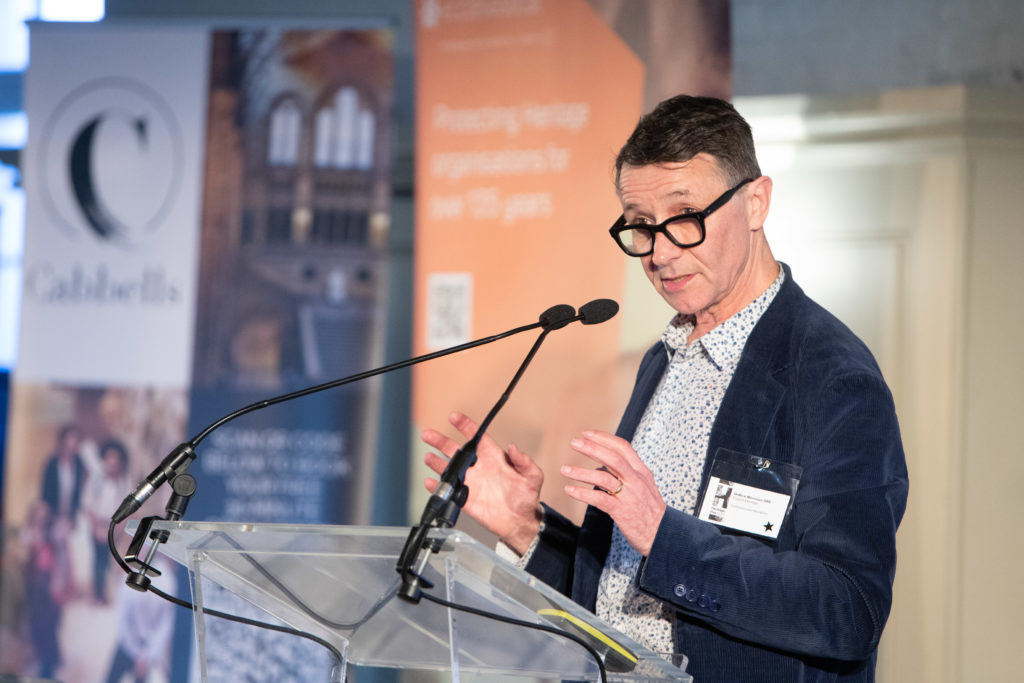
Ecclesiastical Heritage Heroes Awards 2024
The day culminated with the presentation of the Ecclesiastical Heritage Heroes Awards 2024, recognising excellence in heritage volunteering. All nominees featured in a short film highlighting their achievements, screened during the ceremony. The awards were presented by Carole Souter, and Laura Carter, Customer Segment Director at Ecclesiastical Insurance.
[Watch the Heritage Heroes Nominations Video Here] [Link to be added post-event]The winners were:
The Ecclesiastical Heritage Heroes 2024 Award: Braemar Community Ltd Volunteers
This award recognises the remarkable community effort in Braemar, a village of just 400 residents, where approximately 80 people regularly volunteer at the castle. Their work has transformed the castle from a remote entity to a vibrant community asset, with local children now knowledgeable about its history and even leading tours for visitors while dressed in period costumes.
A representative from Braemar Community Ltd stated: “It’s such an honour to be standing here. Braemar is a tiny little community. We are 400 souls, there’s not that many of us. This award is such a tribute to what has been achieved by our dedicated volunteers. Out of these 400 people, we have about 80 who regularly volunteer at the castle. It’s quite extraordinary!”
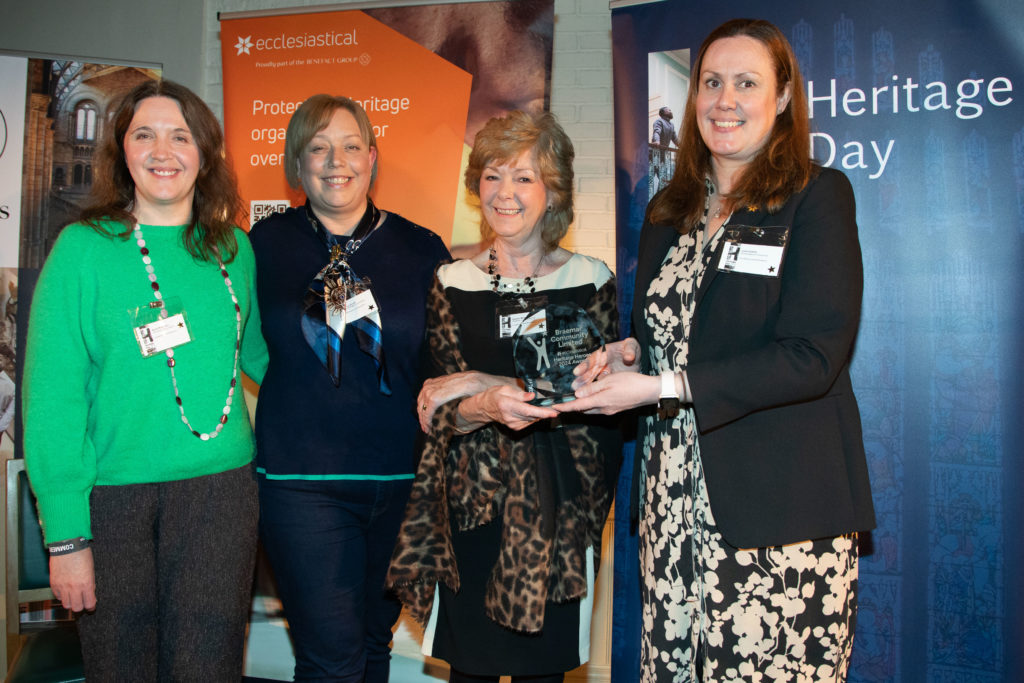
The Ecclesiastical Heritage Heroes Lifetime Award: Valerie Bello (B’nai B’rith)
This award recognises Valerie’s dedication to coordinating the European Days of Jewish Culture and Heritage in the UK. Through B’nai B’rith, a Jewish international, philanthropic, humanitarian and heritage organisation established in the UK in 1910, Valerie has helped preserve and promote Jewish culture and heritage, with events running from September to December each year showcasing a broad variety of activities including tours, guided walks, concerts, exhibitions, lectures and discussions.
Upon receiving the award, Valerie said: “The appreciation of heritage gives us a sense of history and incidentally reinforces our connection too with the local community as well as those further afield, fostering understanding and goodwill. Heritage, indeed, creates.”
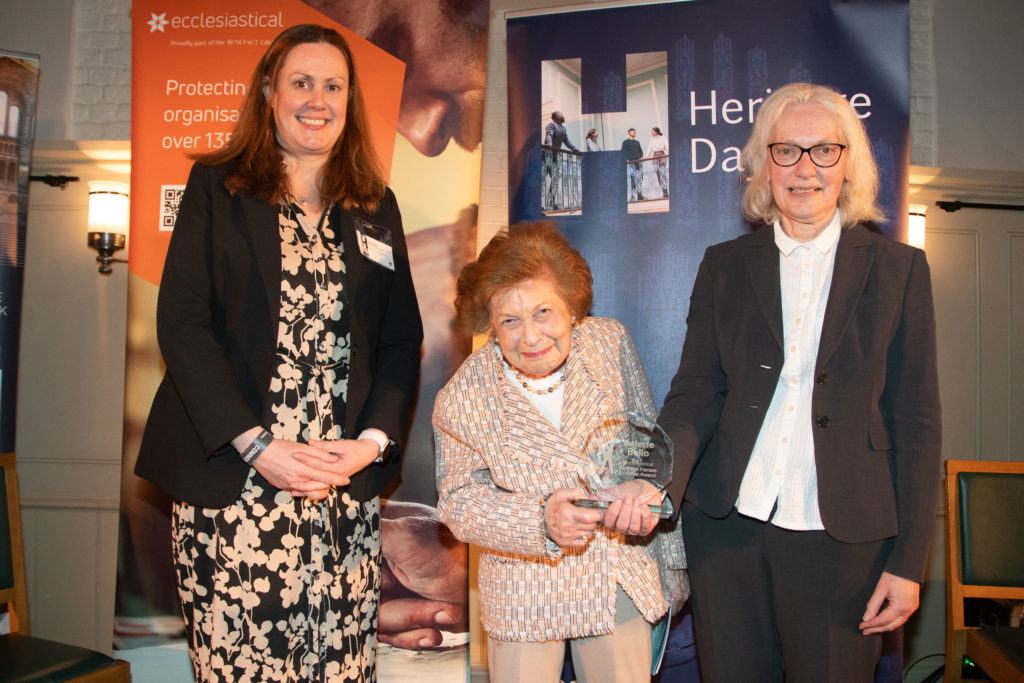
Heritage Day 2025 was made possible through the generous support of Ecclesiastical Insurance (our Corporate Partner), Cabbells (our Headline Sponsor), and our Programme Sponsors (Architectural Heritage Fund, the National Lottery Heritage Fund, City & Guilds Foundation, and Farcroft Restorations Group), with additional support from our venue sponsor Historic Royal Palaces and accessibility sponsor StageText.

Resources
Heritage Creates Report – Our new report showcasing current examples of the ways in which heritage and creativity go hand in hand
Heritage 2033 – The National Lottery Heritage Fund’s ten-year strategy
Heritage Works for Housing – Historic England’s research on creating homes from redundant heritage buildings

